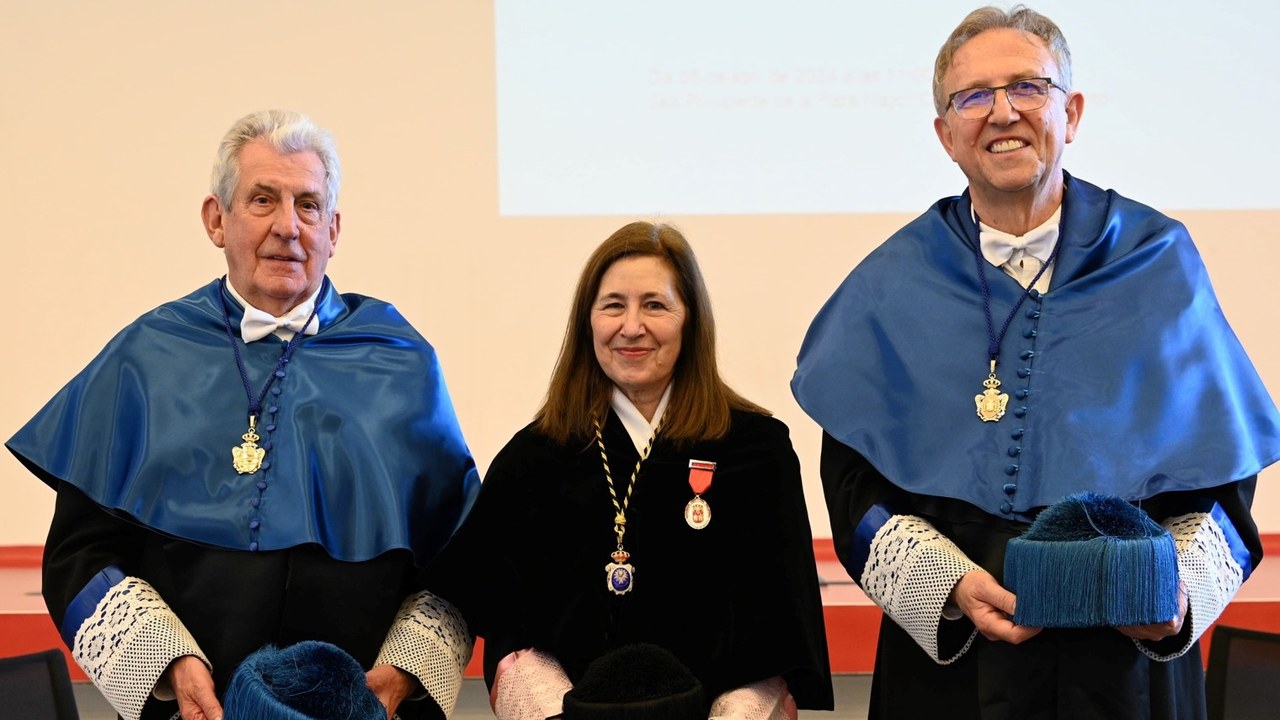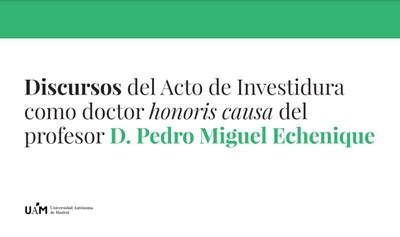Pedro Miguel Echenique receives the Honoris Causa doctorate from the UAM
The Universidad Autónoma de Madrid has conferred the Honoris Causa doctorate to Pedro Miguel Echenique, emeritus professor of the University of the Basque Country (UPV/EHU) and president of the Donostia International Physics Center (DIPC)

The President of the Donostia International Physics Center (DIPC) and Emeritus Professor of the University of the Basque Country (UPV/EHU) Pedro Miguel Echenique was awarded an Honoris Causa doctorate along with professor Eugenio Coronado during a ceremony held today at the Universidad Autónoma de Madrid (UAM). Since its creation in 1968, the UAM has become a world reference in various disciplines of science and the arts, and has among its staff almost a hundred lecturers and outstanding personalities, to whom professor Echenique and professor Coronado are added today through this high distinction.

Professor Echenique’s laudatio was prepared by Professor Fernando Flores, UAM Gold Medal holder and winner of the National Research Prize. In it he provided a complete overview of the research career of Echenique, whom he described as “one of the most important Spanish scientists in the last 30 years”. But before enumerating Echenique’s extensive achievements, he reflected on what he believes defines him as a person: “In science, as in many other things, daring is crucial: that divine instinct that appears in youth and leads us to explore the unknown (…) Pedro has a set of qualities which, no doubt, go together with the daring needed to stimulate his creativity and his success in science.”
From the early years in Echenique's research career, he highlighthed is his work at the prestigious Cavendish Laboratory at the University of Cambridge, under the supervision of the prestigiuos Professor Sir John Pendry. As a result of this work, in 1976 Echenique published his PhD thesis “Interaction of energetic particles with surfaces” and various papers that are considered seminal in the field of surfaces. The collaboration between Echenique and Professors Sir John Pendry and Archie Howie of the Cavendish Laboratory continued over the years, so that in 1985 the University of Cambridge appointed Professor Echenique as an “Overseas Fellow of Churchill College”, a distinction that only Nobel Laureates such as Ken Arrow, Felix Bloch and Phillip Anderson have received.
From his 30 years as a professor of the UPV/EHU, Flores valued Echenique's ability to create a research group of excellence backed by internationally prestigious scientific work, as well as the creation of the infrastructure needed to consolidate this group and to develop and maintain important international collaboration.
This is borne out by the boost given to the creation of the Joint Centre University of the Basque Country-CSIC (National Research Council), the first nanotechnology centre in the Basque Country CIC Nanogune, and above all the Donostia International Physics Center (DIPC), an institution unanimously recognised as a world reference, which publishes over 500 scientific papers every year and receives over 25,000 citations, and which welcomes some 200 scientific visitors from different countries and continents every year.
Read the the Laudatio of Pedro Miguel Echenique by Professor Fernando Flores in Spanish here:
In his acceptance remarks, Professor Echenique expressed his gratitude for this distinction as an important recognition of his scientific career and the excellence of the institution to which he belongs, the University of the Basque Country (UPV/EHU). The rector of the University of the Basque Country, Eva Ferreira, has declared: ‘in few cases will it be more appropriate to use the adjective “excellent” than in the academic and human trajectory of Professor Echenique: an extraordinary research contribution and an extraordinary contribution also in the creation of infrastructures aimed at this activity. But I would like to emphasise more personal elements of his work: his passion for knowledge or his concern when it comes to relating science and beauty. A stimulating and daring conversationalist, he is always willing to transmit his passion for science to new generations and is a proud academic of his university, the University of the Basque Country’.
Professor Etchenique took the opportunity to invite the upcoming generations to pluck up the courage to pursue the path of research. “Anyone who has experienced the pleasure of seeing something, no matter how small, for the first time, the 'moment of discovery', is trapped forever and it will be difficult for them to give up research,” said Echenique. But he sounded a note of warning: “Creativity, both in science and in art, cannot be organised, it arises spontaneously out of individual talent. Those who undertake, those who come up with ideas, those who create wealth, those who create beauty need special nurturing. The best science policy is to create plenty of opportunities for our young people.”
Professor Echenique's numerous distinctions include the Prince of Asturias Award and the Blas Cabrera National Research Prize, the two most prestigious awards in the field of physics in Spain. Internationally, he holds the Max Planck Prize and is an honorary member of the European Physics Society, a title held by only 19 personalities in Physics, including among them eight Nobel Laureates, three former CERN directors and the exceptional astrophysicist Jocelyn Bell Burnell.
The Honoris Causa doctorate is the highest academic distinction of the Universidad Autónoma de Madrid, and is awarded to individuals of extraordinary merit of an academic, scientific, cultural, technical or humanistic nature; they are individuals of recognised national or international prestige and who contribute significantly to the development and promotion of the values of the Universidad Autónoma de Madrid (UAM) or who maintain a close link with this institution. With this distinction, Professor Echenique now holds six Honoris Causa doctorates.

